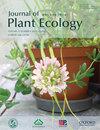The negative effects of soil microorganisms on plant growth only extend to the first weeks
IF 3.9
2区 环境科学与生态学
Q2 ECOLOGY
引用次数: 1
Abstract
Soil biotic communities can strongly impact plant performance. So far, most studies on plant-soil-interactions have estimated the effect of the soil microbial community on plant mass after a fixed duration of plant growth. However, these interactions may change over time and several studies have argued that plant-soil interactions are more important for young seedlings than for older plants. In this paper we ask the question: how long-lasting the effect of the soil microbial community on plant growth is. This is important as the growth rate of a plant is not only determined by the growing conditions but also by the size of the plant itself. Therefore, plant with a reduced growth rate early in life, due to negative effects of the soil microbial community, may increase less in biomass for a much longer period even though the relative growth rates do not differ any longer. We examined the plant growth rates at three stages: early growth (0-21 days), mid growth (22 to 42 days) and late growth (43 to 63 days). We performed two growth experiments with Jacobaea vulgaris lasting 49 and 63 days. Plants were grown in sterilized soil or in sterilized soil inoculated with natural dune soil. In a third experiment, we examined the effect of the timing of soil inoculation prior to planting on the (relative-) growth rate of J. vulgaris plants with four different timing treatments. In all experiments, differences in biomass of plants grown in sterilized soil and inoculated soil (live soil) increased throughout the experiment. Interestingly, linear regression models with ln transformed dry weight against time for younger plants and for older plants in sterilized soil and live soil, respectively, showed that the relative growth rate of plants in the sterilized soil was only significantly higher than that of plants in the live soil in the first two to three weeks. After that period there was no longer a negative effect of the live soil on the relative growth rate of plants. In the third experiment, plant biomass decreased with increasing time between inoculation and planting. Overall, our results show that plants of J. vulgaris grew less well in live soil than in sterilized soil. The negative effects of soil inoculation on plant mass appeared to extend over the whole growth period but arise from the negative effects on relative growth rates that occurred in the first weeks after planting when plants have only less than 5% of the mass they obtained after 42 days. Our study highlights the importance of examining relative growth rates rather than final biomass to estimate the effects of soil microbial communities on plants.土壤微生物对植物生长的负面影响只持续到头几个星期
土壤生物群落可以强烈影响植物的表现。到目前为止,大多数关于植物与土壤相互作用的研究都估计了植物生长一定时间后土壤微生物群落对植物质量的影响。然而,这些相互作用可能会随着时间的推移而变化,几项研究认为,植物与土壤的相互作用对幼苗比对老植物更重要。在本文中,我们提出了一个问题:土壤微生物群落对植物生长的影响有多持久。这一点很重要,因为植物的生长速度不仅取决于生长条件,还取决于植物本身的大小。因此,由于土壤微生物群落的负面影响,在生命早期生长速率降低的植物,即使相对生长速率不再不同,其生物量也可能在更长的时间内增加较少。我们检测了三个阶段的植物生长速率:早期生长(0-21天)、中期生长(22-42天)和后期生长(43-63天)。我们对Jacobaea vulgaris进行了为期49天和63天的两次生长实验。植物生长在无菌土壤中或接种天然沙丘土壤的无菌土壤中。在第三个实验中,我们研究了在种植前土壤接种时间对四种不同时间处理下寻常J.vulgaris植物(相对)生长速率的影响。在所有实验中,在消毒土壤和接种土壤(活土)中生长的植物的生物量差异在整个实验中都有所增加。有趣的是,在灭菌土壤和活土中,年轻植物和年长植物的ln转化干重与时间的线性回归模型分别表明,在最初的两到三周内,灭菌土壤中植物的相对生长速率仅显著高于活土中植物的相对生长速率。在这段时间之后,活土壤对植物的相对生长速率不再有负面影响。在第三个试验中,植物生物量随着接种和种植之间时间的增加而减少。总的来说,我们的研究结果表明,J.vulgaris的植物在活土壤中的生长不如在无菌土壤中的好。土壤接种对植物质量的负面影响似乎延伸到整个生长期,但源于对相对生长率的负面影响,这种负面影响发生在种植后的头几周,当时植物的质量仅低于42天后获得的质量的5%。我们的研究强调了检查相对生长速率而不是最终生物量的重要性,以估计土壤微生物群落对植物的影响。
本文章由计算机程序翻译,如有差异,请以英文原文为准。
求助全文
约1分钟内获得全文
求助全文
来源期刊

Journal of Plant Ecology
生物-植物科学
CiteScore
4.60
自引率
18.50%
发文量
134
审稿时长
3 months
期刊介绍:
Journal of Plant Ecology (JPE) serves as an important medium for ecologists to present research findings and discuss challenging issues in the broad field of plants and their interactions with biotic and abiotic environment. The JPE will cover all aspects of plant ecology, including plant ecophysiology, population ecology, community ecology, ecosystem ecology and landscape ecology as well as conservation ecology, evolutionary ecology, and theoretical ecology.
 求助内容:
求助内容: 应助结果提醒方式:
应助结果提醒方式:


